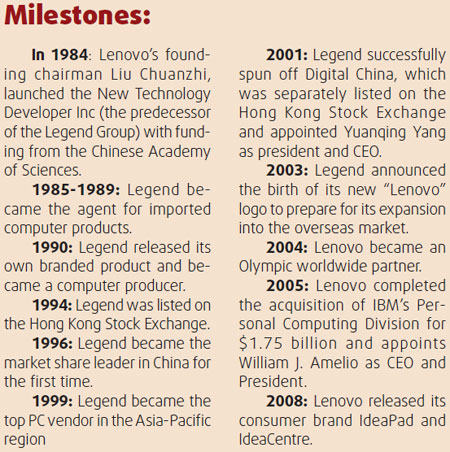
|
BIZCHINA> Top Biz News
 |
|
Lenovo reboots again for 2010
By Wang Xing (China Daily)
Updated: 2009-01-19 07:45
For employees and executives of Chinese computer maker Lenovo Group, the beginning of the new year didn't bring fortune to them as usual. On January 9, Lenovo announced its plan to cut 11 percent of its workforce, or 2,500 jobs worldwide, and to reduce executive compensations by 30 percent to 50 percent as part of measures to counter declining profits amid the global recession. It's part of Lenovo's latest restructuring plan to renovate its business amid the global economic slowdown. As part of the restructuring, Lenovo will also merge its China and Asia Pacific operations to reduce expenses. That will help save $300 million by the end of next fiscal year in March 2010, though the restructuring would cost about $150 million, the company said. This is Lenovo's largest restructuring plan since it acquired IBM's PC department in 2005. During the past three years, Lenovo has successfully stopped the losses in IBM's prestigious but long-time bleeding PC business and risen from a domestic PC maker to one of China's most international companies.
In November last year, Lenovo's profits in its second quarter plunged 78 percent because of sluggish demands in the corporate sector (corporate entities buy 60 to 70 percent of its products) and slower business in China. Its share in the global PC market also dropped to 7.7 percent in the third quarter ending December from 8.2 percent a year earlier, according to research firm IDC. "Although the integration of the IBM PC business for the past three years was a success, our last quarter's performance did not meet our expectations," said chairman Yang Yuanqing in a statement following the second quarter report. Culture clash
Compared with other successful Chinese internalized companies such as Huawei Technologies and Haier that became successful through organic growth, Lenovo is the rare Chinese firm that became successful through acquiring a foreign company. Although that enabled Lenovo to have a business presence in more than 100 foreign countries almost overnight, the acquisition also presented a potential risk for a culture clash within the enlarged company. "Lenovo's problem lies in its inability to copy its success in China to other markets," said Qu Xiaodong, general manager of CCW Research, a domestic consulting firm. "In the past few years, the company has been trying to do that by sending Chinese executives to other markets. But it's been proven that it does not work as well as expected." Thus, Lenovo made many compromises after acquiring IBM's PC business. In 2005, Lenovo gave up the original plan to keep its Beijing headquarters and moved the headquarters to the United States. The company also invited William Amelio, the former Dell executive, to replace Yang Yuanqing as the chief executive of Lenovo. And chairman Yang Yuanqing moved his whole family from Beijing to the US and successfully turned himself to a fluent English speaker. However, experts said that Lenovo's extraordinary gesture increased its difficulty in expanding its successful Chinese experience to other markets and increased the culture conflicts between its Chinese employees and foreign executives. "Lenovo is so eager to succeed that it is willing to give up some of its Chinese identity," Qu said. Increase China's role In Lenovo's last restructuring plan, the two separated Asia Pacific and Greater China regions were merged into a single operation under Chen Shaopeng, Lenovo's former head of Greater China and Russia, Lenovo's most successful market region. The company also moved the Asia Pacific headquarters from Singapore to Beijing. Simon Ye, analyst from research firm Garter, said that restructuring plan reflected its efforts to increase the role of its Chinese operations in the international markets. "Lenovo has made a great effort in marketing itself in foreign market in recent years, including spending a great amount in sponsoring the Beijing Olympic Game. But these efforts did not receive good results," Ye said. He said in the current global economic slowdown, Lenovo needs to reduce its market spending in the foreign markets and pour money to the markets where it could generate more revenue. According to the new plan, Chen Shaoping's territory will increase from 17 countries and regions to 25, contributing to over 50 percent of Lenovo's total revenue. The company also said it will not cut its workforce in the Greater China region. "There is only one way for Lenovo to go and that is to copy its experience in the Chinese market to other regions," said Qu. "But simply sending Chinese executives to foreign markets has failed, so it seems that Lenovo now plans to expand the territory of its Chinese operation team."
 (For more biz stories, please visit Industries)
|
||||||
主站蜘蛛池模板: 澳门毛片在线播放 | 久久成人国产精品 | 久久se精品一区精品二区 | 亚洲国产精品a在线 | 亚洲成在人线中文字幕 | 国产高清视频免费在线观看 | fefe66免费毛片你懂的 | 中文字幕亚洲一区二区v@在线 | 亚洲免费视频网址 | 亚洲欧美精品 | 久久99精品久久久久久野外 | a级成人毛片免费视频高清 a级高清观看视频在线看 | 久草福利资源在线观看 | 男人天堂久久 | 久久道| 99精品欧美一区二区三区美图 | 91亚洲精品在看在线观看高清 | 国产亚洲人成a在线v网站 | 一级做a爰片久久毛片欧美 一级做a爰片久久毛片人呢 | 成人18网址在线观看 | 国产91在线精品 | 欧美成在人线a免费 | 亚洲精品国产一区二区三 | 成人欧美精品一区二区不卡 | 一级片免费在线播放 | 成人毛片免费看 | 特级一级毛片视频免费观看 | 久久成人a毛片免费观看网站 | 在线观看一二三区 | 特级a欧美孕妇做爰片毛片 特级a欧美做爰片毛片 | 99久久伊人一区二区yy5099 | 午夜手机视频 | 91精品国产免费久久久久久 | 全高清特级毛片 | 被老外玩爽的中国美女视频 | 国产精品综合久成人 | 亚洲精品国产综合99久久一区 | 自拍偷拍二区 | 日本成人免费观看 | 在线看片欧美 | 在线观看成年视频 |